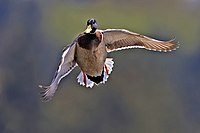Turkish teens died of mutated strain of bird flu
Friday, January 13, 2006

Scientists have confirmed that the H5N1 virus found in the DNA taken from one of two Turkish victims, who died from the disease, has mutated and they now believe that Turkey is now a locale for endemic bird flu.
However, the WHO, stressed that it is too early to tell if the mutation is important.
"We assume this could be one small step in the virus' attempt to adapt to humans," said Mike Perdue, a WHO virologist. "But it's only seen in one isolate and it's difficult to make sweeping conclusions. We just have to wait and see what the rest of the viruses from Turkey look like."
Health officials had raised the number of deaths from the H5N1 virus from 15 to 18 after after it turned up in preliminary tests on two people hospitalised in south-eastern Turkey, and in a girl's lungs after she died in the same area. It also has confirmed 147 human cases of the H5N1 virus worldwide and 78 deaths, though this includes only four infections and two deaths in Turkey.
All victims are thought to have had close contact with poultry.
Health officials suggest the virus can now attach itself more easily to human cells than before.
The mutation has been found in a mutated version of a key protein, haemagglutinin, which controls the way it binds to cells. This, scientists theorize, may be the key in making it more dangerous to people. The mutation makes the virus more capable of attaching itself to human cells before infecting them. But experts said the mutation had been seen before without severe consequences.
Maria Cheng, a spokeswoman for the World Health Organisation, says, "It doesn’t look as if it has significance regarding transmissibility or pathogenicity because it is not borne out by epidemiological evidence we have so far."
Related Wikinews
- "Second Turk dies from bird flu, more suspected to be infected" — Wikinews, January 6, 2006
- "Turkish government accused of being too slow to respond to bird flu" — Wikinews, January 13, 2006
Sources
- Mark Henderson, Science Correspondent. "Victims of Turkish bird flu had a mutated virus strain" — Timesonline.com, January 13, 2006
- Emma Ross. "Mutation found in Turkish bird flu" — scotsman.com, January 13, 2003
- Daniel Williams. "Turkey Braces for Long Battle On Bird Flu" — The Washington post, January 13, 2006
